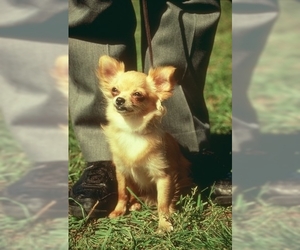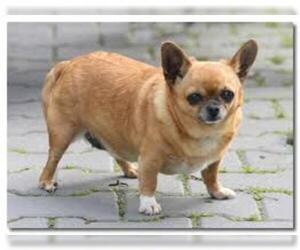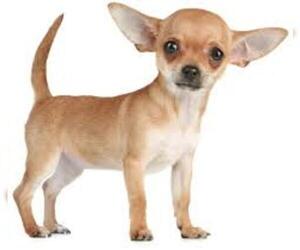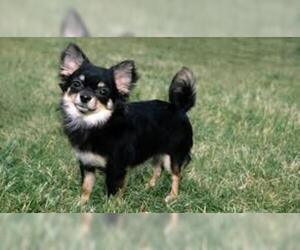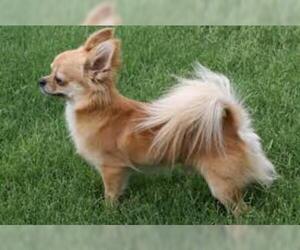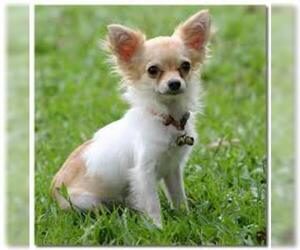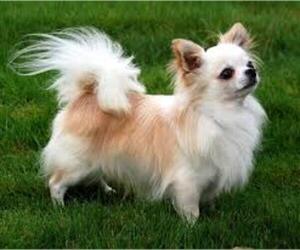
All about Chihuahua dog breed
A.K.A. :Chi, Chi-Chi, Chiwawa, Chee, Pocket Pup, Purse Dog, Taco Bell Dog, Tiny Titan, Mini Mutt, Lap Warrior, Teacup Terror, Chiweenie (mix slang), Apple Head, Deer Head, Chi Pup, Chi Doggo, Chi Baby, Chi Bean, Chi Monster, Chi Buddy, Chi Floof, Chi Nugget, Chi Shadow, Chi Sprout, Chi Prince, Chi Princess, Chi King, Chi Queen, Chi Star, Chi Diva, Chi Dude, Chi Doll, Chi Charm, Chi Whisper, Chi Rocket, Chi Rascal, Chi Snugglebug, Chi Snorter, Chi Squeak, Chi Zoomer, Chi Zoomie, Chi Snip, Chi Snapper, Chi Scout, Chi Scoutie, Chi Tinker, Chi Tink, Chi Tuff, Chi Puff, Chi Pipsqueak, Chi Pupper, Chi Pal
Size
Grooming requirements
Exercise requirements
Good with other dogs
Watchdog ability
Energetic
Training requirements
Playful
Affectionate
Good with other pets
Good with children
Good with strangers
Winter
Summer
Healthiness
Protective
Life Span
| Pure Breeds | Member |
| Breeds A - Z | C |
| Breeds by Group | Companion Toy |
| Breeds by Trait | Hypoallergenic Low Shedding |
| Overview: | The Chihuahua, a captivating breed known for its diminutive size, boasts an ancient and somewhat mysterious origin, with most theories pointing to Mexico as its birthplace, potentially descending from the "Techichi," a small companion dog of the Toltec civilization. Physically, they are easily recognizable by their small, compact bodies, large expressive eyes, and erect ears, appearing in both smooth and long-coated varieties, showcasing a vast array of colors and markings. Despite their tiny stature, Chihuahuas possess a big personality; they are often described as spirited, alert, and fiercely loyal to their owners, sometimes displaying a bold and confident demeanor. While their small size makes them exceptionally well-suited for apartment living, they thrive in homes where they receive ample attention and mental stimulation. They can be good family pets for older children who understand how to interact gently with a small dog, but their delicate build makes them less suitable for boisterous toddlers. Regarding health, Chihuahuas can be prone to certain conditions like patellar luxation, heart problems, and dental issues, making regular veterinary check-ups crucial for their well-being. |
F.A.Q.
All You Need to Know About the Chihuahua Breed
The Chihuahua is a captivating companion, originating from Mexico and known for its vibrant personality despite its tiny stature. These pint-sized pups are loyal, affectionate, and surprisingly fierce, often believing they're much larger than they are. Physically, they come in both smooth-coat and long-coat varieties, boasting large expressive eyes and often apple-domed heads. Their small size makes them perfect for apartment living and they require minimal exercise, a short daily walk or indoor play sufficing. While generally good with older, respectful children, they can be delicate and require supervision with very young kids. Grooming is straightforward; smooth-coats need occasional wiping, while long-coats require more frequent brushing to prevent mats. Potential owners should be aware of common health issues like patellar luxation and hypoglycemia. If you're seeking a devoted, portable, and spirited companion, the Chihuahua might be your perfect match!The average weight for an adult Chihuahua is between 4 to 6 pounds. While there can be slight variations, typically both male and female Chihuahuas fall within this range, maintaining a healthy weight for Chihuahua. Some individuals may be slightly smaller or larger, but this average size represents the majority of the breed.
Wondering about the Chihuahua height? These tiny dynamos pack a lot of personality into a small package! The average size of an adult Chihuahua is typically between 6 to 9 inches tall when measured at the shoulder (the highest point of their back, where the neck meets the body).
To give you a clearer picture of how tall is a Chihuahua, here's a quick breakdown:- Typical Adult Height Range: Most Chihuahuas will stand between 6-9 inches at the shoulder. This compact stature is one of their defining characteristics as a toy breed.
- Average Height: While the range is 6-9 inches, many Chihuahuas fall comfortably in the 7-8 inch range.
- Gender Variation: Generally, there isn't a significant or consistent height difference between male and female Chihuahuas. Both genders typically fall within the same 6-9 inch range. Any slight variations are more likely due to individual genetics rather than sex.
- Individual Genetics: Just like people, every Chihuahua is unique! Some may be on the smaller end of the spectrum (closer to 6 inches), while others might be slightly taller (closer to 9 inches). These variations are perfectly normal and depend on their individual genetic makeup.
Chihuahua Colors: A Comprehensive GuideChihuahuas boast an incredibly diverse range of Chihuahua colors and patterns. When considering a Chihuahua, understanding these variations, especially those AKC recognized Chihuahua colors, is crucial.Officially Recognized Colors by Major Kennel Clubs (e.g., AKC):The American Kennel Club (AKC) recognizes almost any color or pattern in the Chihuahua breed, with the exception of merle (discussed below). Common and highly sought-after AKC recognized Chihuahua colors include:* Black: Solid black or black with various tan/red markings.* Chocolate: A rich, dark brown, often with lighter tan points.* Fawn: A light tan to reddish-brown, one of the most classic Chihuahua colors.* Cream: A pale, off-white to yellowish hue.* White: Pure white, though often found with small patches of other colors.* Red: A vibrant, reddish-brown.* Gold: A shiny, warm yellow to orange-brown.Patterns Accepted:Beyond solid colors, various patterns are accepted:* Brindle: Stripes of darker color over a lighter base, a striking and popular pattern.* Sable: Black-tipped hairs over a lighter base color, giving a shaded appearance.* Tri-color: A combination of three distinct colors, typically black, white, and tan.* Parti-color: Any color combined with white patches.* Black and Tan: A classic combination.* Chocolate and Tan: Similar to black and tan, but with chocolate as the primary dark color.Rare and Exotic Chihuahua Variations (Not AKC Recognized):While visually appealing, some rare coat types and exotic Chihuahua variations are not accepted by major kennel clubs like the AKC due to potential health concerns linked to the genes responsible for these colors. These colors may command higher prices but buyers should be aware of the associated risks and ethical breeding practices.* Blue: A dilute black, appearing as a grey or slate color. Often linked to a dilute gene that can cause skin and coat issues.* Lilac: A dilute chocolate, appearing as a pinkish-grey or Isabella color. Also associated with the dilute gene.* Merle: A pattern characterized by irregular patches of diluted color and solid color, often with blue or odd-colored eyes. The merle gene can cause serious health problems, including deafness, blindness, and skeletal deformities, especially when two merle parents are bred together. The AKC disqualifies merle Chihuahuas from the show ring and does not accept it as a recognized color.When choosing a Chihuahua, research the breeder thoroughly and prioritize health over an unusual color. While Chihuahua colors are aesthetically pleasing, a healthy, well-socialized puppy should always be the primary consideration.
Chihuahua Personality & TemperamentThe Chihuahua is a lively, loyal, and affectionate companion, known for its charming and distinctive personality. Despite their small size, Chihuahuas possess a bold and confident spirit. They form strong bonds with their owners, often displaying a fiercely devoted and protective nature.Chihuahuas are generally friendly with their families, thriving on attention and Cuddles. They are highly intelligent and can be very adaptable, making them excellent apartment dwellers due to their minimal space requirements. However, early socialization is crucial to ensure they are comfortable with new people and environments. Without it, they can sometimes be reserved or wary of strangers.Regarding sociability, Chihuahuas can coexist peacefully with other pets, especially when introduced properly and raised together. When it comes to children, Chihuahuas are generally best suited for homes with older, respectful children who understand how to interact gently with a small dog. Their delicate build means they can be easily injured by rough play. With proper training and socialization, a Chihuahua can be a wonderful, loving, and energetic addition to many homes.
The Chihuahua temperament is often described as bold, alert, and surprisingly spirited for their small size. These charming companion dogs are intensely loyal to their families, forming strong bonds and often choosing one person as their primary focus. While generally affectionate with their owners, they can be reserved or even wary of strangers, making early socialization crucial.
Friendliness towards familiar people is high, and they thrive on attention and companionship. Their small stature makes them highly adaptable to apartment living, and they are not typically high-energy, enjoying lap time as much as short walks. Regarding sociability with children and other pets, Chihuahuas can be good with older, respectful children who understand how to interact gently with a small dog. Due to their delicate build and tendency to be protective of their space, they are generally not recommended for homes with very young, boisterous children. With proper introduction and supervision, they can coexist peacefully with other well-behaved pets, though some may exhibit a "big dog" attitude and try to dominate larger animals. They can show tendencies toward stubbornness, particularly during training, so consistency and positive reinforcement are key. They are also quite sensitive and can be prone to anxiety if not properly socialized or if left alone for extended periods. Their devotion and lively personality traits make them excellent, attentive companion dogs for those seeking a small but mighty friend.Chihuahua Care: Daily Maintenance & Health Tips
Chihuahua care is relatively straightforward, making them popular companions. Their small size means they are generally a low-energy dog breed, requiring minimal exercise—short daily walks and indoor play are usually sufficient. Despite their low energy, regular activity helps prevent obesity, a common concern. Grooming needs vary slightly between long-haired and smooth-coated Chihuahuas. Smooth coats require weekly brushing to remove loose hair and maintain shine. Long coats need more frequent brushing (2-3 times a week) to prevent mats and tangles. Both varieties benefit from occasional bathing, about once a month or as needed. Dietary considerations are crucial for their tiny stomachs. Feed high-quality, small-breed specific dog food, adhering strictly to portion control to manage their weight effectively. Due to their predisposition to dental issues, regular teeth brushing (daily if possible) and dental chews are vital for preventing plaque buildup and gum disease. Special attention should be paid to wrinkle and ear cleaning. Their delicate ears should be checked weekly for wax buildup or signs of infection and gently cleaned. While most Chihuahuas don't have prominent wrinkles, any skin folds should be kept clean and dry to prevent irritation. Climate sensitivity is a significant factor due to their small size and brachycephalic (short-nosed) anatomy, which makes them susceptible to both cold and heat. Chihuahuas get cold easily; they need sweaters or coats in cooler weather. They also overheat quickly, so avoid strenuous activity in hot weather and always provide shade and fresh water. Never leave them unattended in a car. Common Chihuahua health tips include monitoring for patellar luxation, heart conditions, and hypoglycemia (especially in puppies). Skin issues can arise if grooming or cleaning isn't consistent. Regular veterinary check-ups are essential for early detection and prevention of these and other conditions. Proper weight management is key to their overall health and longevity. Understanding how to care for a Chihuahua ensures a happy, healthy life for these charming little dogs.The Chihuahua activity level is moderate, balancing surprising bursts of energy with a strong preference for rest and cuddling. Despite their small size, Chihuahuas are not simply lap dogs and do require daily exercise to stay healthy and happy.Typical Energy Levels: Chihuahuas are known for their lively and spirited personalities. They often enjoy short, intense play sessions followed by long periods of napping. You'll frequently see them zipping around the house or yard with impressive speed, but they're equally content to curl up on a warm lap.Daily Exercise Needs: To meet their exercise needs, 20-30 minutes of daily activity is generally sufficient. This can be broken into two or three shorter walks or play sessions. A couple of short walks around the block, combined with indoor playtime, will keep them well-exercised. Mental stimulation through toys and training is also important to prevent boredom.Playtime Preferences: Chihuahuas love interactive playtime with their owners. They enjoy chasing small balls, tug-of-war with appropriate toys, and learning new tricks. Many also appreciate puzzle toys that challenge their minds.Limitations (Brachycephalic Anatomy): It's crucial to be mindful of their brachycephalic (short-nosed) anatomy. Due to their flattened snouts, Chihuahuas can be prone to respiratory issues, especially in hot or humid weather. Avoid strenuous exercise during peak heat, always provide fresh water, and watch for any signs of overheating like excessive panting or distress. Short walks in cooler parts of the day are best.How active are Chihuahua? They are a breed that balances short bursts of energy with long periods of rest. They thrive on companionship and enjoy being involved in family activities, even if that means just observing from a comfortable spot.Suitability: Chihuahuas are suitable for both active families who understand their physical limitations and low-energy households. They can adapt well to apartment living thanks to their small size and moderate exercise needs, as long as they receive consistent daily engagement. Their adaptability makes them a versatile companion for various lifestyles.
Breed Breakdown: What Experts Say About the Chihuahua
I'd rate the "Size" trait of the Chihuahua breed as a 1.5. Chihuahuas are undeniably tiny, consistently ranking among the smallest dog breeds in the world. Their average weight typically falls between 2 to 6 pounds, and their height rarely exceeds 9 inches at the shoulder. They possess a delicate, compact body structure that emphasizes their miniature stature. When compared to other companion dogs like Beagles, Cocker Spaniels, or even Pugs, the Chihuahua is significantly smaller in every physical dimension. This extremely small size makes them exceptionally well-suited for apartment living, frequent travel (often fitting comfortably in airplane cabins as carry-on), and households with severe space constraints. They require minimal physical space and can often get sufficient exercise within a small indoor environment.
I would rate the grooming requirements of the Chihuahua breed as a 4.While Chihuahuas are generally considered low to moderate maintenance, they aren't entirely "wash and wear" like some extremely short-coated breeds. Their two main coat types, smooth and long-haired, contribute to this rating. The smooth coat requires minimal brushing, perhaps once a week to remove loose hair, but they do shed year-round, which can be surprising for their small size. The long-haired variety, however, demands more attention, needing brushing several times a week to prevent mats and tangles, especially behind the ears, in the armpits, and on their feathery tails.Beyond their coat, other grooming needs are fairly standard for companion dogs. Nail trimming is crucial and often required every 2-4 weeks, as long nails can cause discomfort and gait problems. Ear cleaning should be done regularly, perhaps weekly or bi-weekly, to check for wax buildup or signs of infection, especially given their upright ears which can still collect debris. Bathing needs are moderate; once a month or every few weeks is usually sufficient unless they get particularly dirty. Chihuahuas are not particularly prone to skin fold issues due to their typically tight skin, and while they can experience allergies like any breed, they aren't inherently more susceptible to skin issues requiring specialized care beyond regular observation.Compared to breeds with dense double coats, elaborate hairstyles, or extensive skin folds, Chihuahuas are relatively easy to care for, but the long-haired variety elevates their needs beyond extremely low-maintenance breeds. They require consistent, but not overly time-consuming or specialized, attention to keep them looking and feeling their best.
I would rate the Chihuahua's "Exercise Requirements" at a 3.While Chihuahuas are known for being small and can thrive with less physical activity than many larger breeds, they are not completely sedentary. Their energy levels can vary, with some being quite spry and others more laid-back. Daily short walks (15-30 minutes) are generally sufficient, allowing them to explore and stretch their legs. They also enjoy indoor playtime, which can involve chasing toys or engaging in short bursts of activity. Due to their brachycephalic anatomy, sustained, intense exercise, especially in warm weather, should be avoided as it can lead to respiratory distress. They are not typically suited for activities requiring long periods of strenuous movement. However, despite their small size, they are intelligent and benefit from mental stimulation, which can be achieved through training and interactive play rather than extensive physical exertion. They are a breed that thrives with minimal to moderate activity, primarily focusing on short bursts of play and leisurely strolls, and do not typically require structured, high-intensity routines to stay healthy and mentally stimulated.
I'd rate the Chihuahua's "Watchdog Ability" at a 7 out of 10.Chihuahuas are surprisingly effective as watchdogs, despite their diminutive size. Their highly alert nature and keen senses mean they are quick to pick up on unusual sounds or the presence of strangers. This often translates into frequent and surprisingly loud barking, which, while not intimidating to a human, is certainly effective at signaling an unusual event to their owners. They possess strong territorial instincts within their perceived home and are not shy about vocalizing their disapproval of anything they deem out of place or a potential threat. While they won't physically deter an intruder, their persistent and often shrill barking provides excellent early warning. They are definitely more than just passive companions; they are miniature alarm systems that take their role seriously in a home environment.
I would rate the "Good with Other Dogs" trait of the Chihuahua breed a 5 out of 10.Chihuahuas are not inherently highly sociable or dog-friendly in the way a Golden Retriever or Labrador might be. Their typical behavior around unfamiliar dogs can be quite varied. Some, particularly well-socialized individuals, might be curious and polite, but it's equally common to see Chihuahuas display timidity, nervousness, or even a surprising amount of bravado and snappiness, especially towards larger or more boisterous dogs. Their small size often makes them feel vulnerable, which can manifest as fear-based aggression or a need to assert themselves to compensate.Compatibility with dogs of different sizes and energy levels is a significant factor. While they can coexist peacefully with other small, calm dogs, larger or high-energy breeds can easily overwhelm a Chihuahua, leading to stress, injury, or reactive behavior. They often struggle to interpret the play signals of bigger dogs, making careful supervision and management crucial in mixed-size groups.Socialization needs are paramount for Chihuahuas to be successful with other dogs. Without consistent, positive exposure from a young age, they are much more likely to develop fear or aggression. Even with good socialization, they rarely thrive in chaotic canine company and often prefer the company of familiar, calm dogs or people. Potential for aggression or dominance, while usually not outright dangerous due to their size, can be present in the form of resource guarding, territoriality, or "small dog syndrome" where they believe they are much larger than they are. Adaptability in multi-dog households requires careful consideration of the other dogs' temperaments and sizes. They can coexist peacefully, but it's usually achieved through careful introductions, consistent training, and ensuring the Chihuahua feels secure and not threatened. They require careful introductions and ongoing training to coexist peacefully, rather than naturally thriving in a broad range of canine company.
I would rate the "Energetic" trait of the Chihuahua breed a 7 out of 10.Chihuahuas, despite their small size, are surprisingly energetic and possess a lively spirit. They are naturally active and playful, often displaying bursts of zoomies and a keen interest in engaging with their owners. Their typical activity level involves a good deal of indoor scampering and a desire for short, frequent walks. They have a decent endurance for their size, capable of keeping up on a neighborhood stroll, and their playfulness often manifests in chasing toys or wrestling with other small dogs. They do have a moderate need for physical stimulation; while they aren't marathon runners, they thrive on mental and physical engagement through games and exploring. Compared to more laid-back companion dogs like a Shih Tzu or a Cavalier King Charles Spaniel, Chihuahuas are generally more alert and ready for action.However, their brachycephalic (short-nosed) anatomy does significantly affect their stamina and exercise tolerance. This characteristic can lead to respiratory difficulties, especially in warmer weather or during strenuous activity, meaning they are prone to overheating and becoming winded quickly. While they enjoy outdoor activities, their participation in highly athletic or prolonged endurance events is limited by this physiological constraint. They require careful monitoring during exercise to prevent overexertion, and while they have the spirit for more, their physical makeup often dictates shorter, less intense bursts of activity.
I would rate the training requirements of the Chihuahua breed a 6.Chihuahuas aren't inherently difficult to train, but they aren't a "set it and forget it" breed either. Their intelligence is often underestimated, but their small size can sometimes make owners lax in their expectations. They can be quite stubborn, especially if they perceive a command as unnecessary or if they're not adequately motivated. Their attention spans can be fleeting, particularly if there are more interesting sights or sounds. While they are generally responsive to commands when properly motivated, consistency is paramount. Positive reinforcement, such as treats, praise, and play, is highly effective, as they often thrive on attention and approval from their owners. However, a lack of consistency or an over-reliance on pampering can quickly lead to undesirable behaviors like excessive barking, resource guarding, or "small dog syndrome." Therefore, while a beginner can certainly train a Chihuahua, they need to be prepared for the dedication and structured routines required to counteract potential stubbornness and ensure good behavior. Experienced handling might be beneficial for those looking to achieve advanced obedience or address more ingrained behavioral issues.
I would rate the "Playful" trait of the Chihuahua breed a 7 out of 10.Chihuahuas, despite their small size, are surprisingly spirited and often possess a delightful zest for life. They are generally quite active for a toy breed, enjoying short bursts of zoomies and showing a clear love for games and interaction with their chosen humans. They are very responsive to toys, especially those that squeak or can be chased, and can be quite entertaining in their efforts to "hunt" and "kill" their playthings. Their attention-seeking behavior often manifests as nudging, following, or even barking to initiate playtime. While they certainly have their calm, cuddly moments, their overall enthusiasm in daily life is quite high. They are naturally more spirited and less laid-back compared to some other companion dogs, often displaying a bold and confident personality that translates into a keen desire for fun and engagement. However, their small stature means their energy output isn't as sustained as a larger, more athletic breed, which is why they aren't a perfect 10, but they are far from inactive.
I'd rate the "Affectionate" trait of the Chihuahua breed a strong 9 out of 10. Chihuahuas are renowned for their intense desire for human companionship and often form incredibly strong bonds with their primary owner. They are quintessential "lap dogs," frequently seeking physical closeness, whether it's snuggling under blankets, perching on a shoulder, or simply resting against a leg. Their loyalty is unwavering, and they are highly sensitive to their owner's emotions, often offering comfort or mirroring moods. This breed typically thrives on affection, becoming deeply attached and exhibiting a strong tendency to follow their family members from room to room, preferring to be in constant proximity rather than being independent.
Rating: 6/10Explanation: Chihuahuas can be a mixed bag when it comes to coexisting with other pets, which is why they land squarely in the middle with a 6. While they *can* be extremely pet-friendly, it's not always their natural inclination and often requires significant effort. Their prey drive, though typically not as strong as some terrier breeds, can still be present, especially towards smaller, faster-moving animals like cats or rodents, leading to playful (or sometimes more assertive) chasing. Resource guarding is a common concern with Chihuahuas; they can become very possessive of their food, toys, and even their human companions, which can create tension in a multi-pet household.However, Chihuahuas are also highly adaptable and intelligent. With early and consistent socialization, positive reinforcement training, and careful supervision, they can absolutely learn to coexist peacefully and even form strong bonds with other dogs and cats. They often thrive in multi-dog households where they are not the only pet, as long as the other animals are introduced carefully and boundaries are established. The key is that they are not inherently "extremely pet-friendly" without human intervention; their compatibility largely depends on the individual dog's personality, early experiences, and the owner's commitment to training and managing their interactions. They often require training and supervision to ensure peaceful coexistence, rather than being naturally sociable with all other species.
Rating the "Good with Children" trait of the Chihuahua is complex, as it significantly depends on individual dog temperament, socialization, and the age and behavior of the children. However, considering the breed's general characteristics, I would rate the Chihuahua a 4 out of 10.Chihuahuas are not inherently a naturally gentle and affectionate breed with children. Their small size makes them particularly vulnerable, leading many to be wary or even snappy when approached by boisterous or clumsy children. They have a tendency to bond very strongly with one or two individuals, and can be less tolerant of perceived intrusions from others, especially young children who may not understand boundaries. Their patience for noise and handling is generally low; they can be easily startled and are not typically robust enough for rough play. While some Chihuahuas can be playful with older, respectful children, their delicate build and often feisty temperament make them a poor match for younger kids who might accidentally injure them or misinterpret their warning signs. Training and consistent supervision are absolutely critical to ensure a positive interaction, and even then, their suitability is limited, primarily to families with older, well-behaved children who understand how to interact gently with a small dog.
I'd rate the "Good with Strangers" trait of the Chihuahua breed a 4.Chihuahuas are generally known for their strong bond with their primary caregivers and can be quite reserved, even suspicious, of unfamiliar adults. While not inherently aggressive, their small size often contributes to a "big dog in a little body" mentality, leading to a higher likelihood of barking, growling, or even nipping as a form of self-defense or guarding when confronted by strangers. They are not naturally outgoing; instead, they often require extensive and early socialization training to be comfortable and calm in the presence of new people or in bustling public environments. Without this consistent training, they tend to be wary, anxious, or vocal around guests and unfamiliar situations.
I would rate the Chihuahua's winter tolerance as a 1. They exhibit extreme sensitivity to cold due to a combination of factors. Their single, short coat offers minimal insulation, and their small body mass means they lose heat very rapidly. They have little body fat to protect them from the cold. While not typically brachycephalic, their tiny size inherently puts them at a higher risk of hypothermia, even in moderately cool temperatures, let alone truly cold ones. They are largely unable to safely enjoy outdoor activity in cold climates for any significant duration. Compared to most other companion dogs, Chihuahuas absolutely require special care during winter months, including warm clothing (sweaters, coats), limiting outdoor time to only what is necessary for quick potty breaks, and ensuring a warm indoor environment.
Rating: 3Chihuahuas possess a very low tolerance for summer heat, necessitating significant care during warmer months. Their small size and single coat offer minimal insulation against high temperatures. More importantly, while not severely brachycephalic, their shorter snouts can still contribute to less efficient panting compared to long-nosed breeds, making it harder for them to regulate their body temperature effectively. This makes them highly susceptible to heatstroke, even in moderately warm conditions. Outdoor activity levels should be severely curtailed during the hottest parts of the day, limited to very early mornings or late evenings for short potty breaks, and always supervised. They absolutely require climate control during hot weather, meaning air conditioning or a cool, shaded environment indoors is essential. Compared to most other companion dogs, Chihuahuas require considerably more special care in summer, including constant access to fresh water, avoiding asphalt, and never being left unsupervised outdoors.
I would rate the "Healthiness" trait of the Chihuahua breed a 4 out of 10.While Chihuahuas are known for their relatively long lifespan (often 12-20 years), which might suggest robustness, they are unfortunately prone to a significant number of breed-specific health issues due to their small size and genetic predispositions. They are commonly affected by patellar luxation (slipping kneecaps), tracheal collapse, hydrocephalus, dental problems (due to small mouths and overcrowding), heart conditions like patent ductus arteriosus (PDA), and eye conditions such as glaucoma and progressive retinal atrophy. Their delicate bone structure also makes them more susceptible to fractures. While responsible breeding and preventive care can mitigate some of these risks, they don't eliminate the inherent predispositions. Compared to many other companion dogs, Chihuahuas are generally considered high-maintenance in terms of health, often requiring careful monitoring, specialized dental care, and sometimes costly veterinary interventions for conditions common to the breed. They are far from a generally robust breed, and their small stature often belies a fragile constitution.
Rating: 7/10Chihuahuas, despite their diminutive size, often possess a surprisingly strong "protective" trait. They are incredibly alert to their surroundings, acting as vigilant little watchdogs. Their territorial instincts can be quite pronounced, leading them to bark at perceived threats or intruders, be it a delivery person or a squirrel in the yard. Their loyalty to their owners is unwavering, and this devotion often fuels their protective impulses; they will readily position themselves between their beloved human and a stranger, even if it's a grand gesture rather than a physically imposing one. Their reaction to strangers typically involves a good deal of vocalization and sometimes even a brave, if ultimately ineffectual, attempt to deter.While a Chihuahua's protective nature makes them excellent watchdogs, reliably alerting owners to anything amiss, it's crucial to understand their limitations. They are fundamentally companion dogs, bred for companionship and affection. They can certainly offer a household a sense of security through their early warning system, but they are absolutely not capable of offering meaningful physical protection as a guard dog. Their "protection" is primarily in the form of an alarm, not a physical deterrent. They are fiercely loyal and courageous, but their size dictates that their protective role is more about sound and presence than actual defense.
I would rate the "Life Span" trait of the Chihuahua breed a 9 out of 10.Chihuahuas are renowned for their exceptional longevity, consistently ranking among the longest-lived dog breeds. Their average life expectancy typically ranges from 14 to 16 years, with many individuals living well into their late teens and even surpassing 20 years. This makes them a definitively long-lived breed compared to most other companion dogs. While they can be prone to certain health issues like patellar luxation, dental problems, and heart conditions, these are often manageable with responsible breeding, consistent veterinary care, and proper nutrition. Their small size and generally robust constitution, when responsibly bred, contribute significantly to their extended lifespan, allowing owners to enjoy many years with their tiny companions.
Chihuahua Puppies for saleSee all puppies for sale
Chihuahua Dogs for adoptionSee all dogs for adoption
Chihuahua BreedersSee all breeders
Similar Dog Breeds for Chihuahua
Breed Mixes of Chihuahua
Quick Breed Selector 0 - not important, 1 - smallest, 10 - largest
Variants & Mistakes :Chiuhauhua, Chihuhua, Chihuaua, Chihauhua, Chihuaha, Chihuahau, Chihauaua, Chihauhau, Chiwawa, Chiwawah, Chewawa, Cheewawa, Chihuwa, Chuhuhua, Chiuahua, Chuhia, Chuhua, Chiua, Chiuha, Chuwa, Chihua, Chiwua, Chiwuawa, Chiuhuaua, Chihahuha, Chiahua, Chiahuahua, Cheehua, Chewahuahua, Chuahua, Chihuahuaa, Chihauha, Chiwhua, Chihuhau, Chihauhuahua, Cheewahuahua, Chiuhahua, Chiuaua, Chiwahwah, Chuawah
